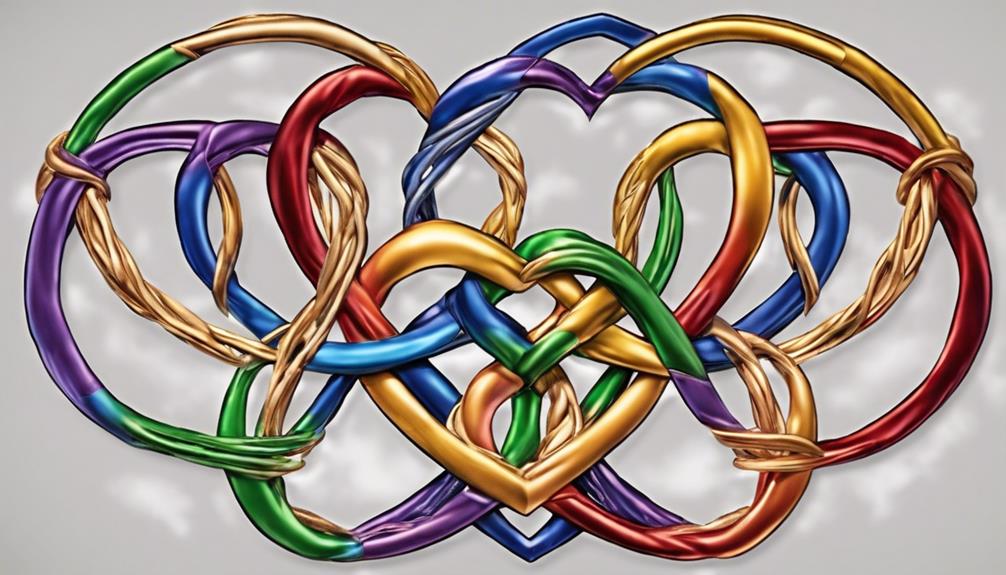When comparing ethical non-monogamy and polyamory, it is like analyzing the different flavors in a intricate dish; the little details are important. Recognizing the distinctions in these relationship dynamics can help us understand various ways to experience love and connection.
Let's unravel the intricate threads that distinguish these two concepts, peeling back the layers to reveal the essence of each and the implications they hold for those navigating the realm of non-traditional relationships.
Key Takeaways
- Ethical non-monogamy encompasses various relationship styles beyond romantic love.
- Polyamory specifically focuses on nurturing deep emotional and romantic connections with multiple partners.
- Communication, honesty, and respect are essential in both ethical non-monogamy and polyamory.
- Establishing clear boundaries and mutual consent are vital practices in both relationship dynamics.
Overview of Ethical Non-Monogamy Vs. Polyamory
When exploring the distinctions between ethical non-monogamy and polyamory, it's essential to understand the fundamental principles that differentiate these relationship structures. In ethical non-monogamous relationships, people engage in consensual non-monogamous arrangements that prioritize open communication, honesty, and respect. This umbrella term includes various relationship styles like open relationships and poly-fidelity, where individuals navigate multiple romantic or sexual connections with transparency and integrity.
On the other hand, polyamory specifically focuses on loving multiple people romantically, emphasizing emotional bonds over solely sexual interactions. While polyamory falls under the broader category of ethical non-monogamy, it distinguishes itself by highlighting the significance of developing deep emotional connections with multiple partners. In polyamorous relationships, communication plays a crucial role in fostering understanding, trust, and intimacy among all individuals involved.
Key Philosophical Differences

In examining the key philosophical differences between ethical non-monogamy and polyamory, it's crucial to delve into the foundational principles that underpin each relationship structure. Ethical non-monogamy, a broad concept, encompasses all consensual non-monogamous relationships, while polyamory specifically focuses on loving multiple people romantically. Polyamory places a strong emphasis on emotional connections and nurturing multiple romantic relationships, whereas ethical non-monogamy allows for diverse relationship styles beyond just romantic love, such as open relationships or polyfidelity.
Communication, honesty, and respect are essential in both ethical non-monogamy and polyamory. However, ethical non-monogamy requires these elements among all partners, regardless of the nature of the relationships, while polyamory specifically highlights the importance of romantic love and emotional bonds. Polyamory prioritizes intimate relationships with multiple partners, while ethical non-monogamy embraces various relationship structures, including but not limited to romantic connections. Understanding these distinctions is vital for individuals navigating non-monogamous relationships and exploring the intricacies of diverse relationship dynamics.
Relationship Structures and Boundaries
Exploring diverse relationship structures and boundaries in ethical non-monogamy involves understanding the nuances of each dynamic and establishing clear communication channels among all partners involved.
In ethical non-monogamous dynamics, individuals may navigate through various relationship structures such as polyamory, open relationships, monogamish arrangements, polyfidelity, and relationship anarchy. Each of these structures brings its own set of challenges and rewards, requiring open communication, negotiation, and mutual consent to thrive.
By setting clear boundaries and fostering a deep understanding of each partner's needs and desires, individuals can create a framework that respects everyone involved. The journey of defining these relationship structures is a deeply personal one, where individuals explore the depths of their emotions, desires, and vulnerabilities.
It's through this exploration that a tapestry of connections is woven, each thread representing a unique bond forged through mutual understanding and respect.
Communication and Transparency Practices

Navigating the intricate dynamics of ethical non-monogamy and polyamory demands a foundation built on unwavering communication and complete transparency among all partners involved. In ethical non-monogamy, open communication is key to ensuring that everyone is on the same page regarding desires, boundaries, and relationship structures. This ongoing communication helps cultivate a sense of trust and respect within the romantic network, making sure that feelings are acknowledged and addressed.
Similarly, polyamory emphasizes transparency practices that involve discussing emotional connections and sexual interactions with all partners involved. Being open about one's feelings and desires is fundamental to maintaining healthy relationships within the polyamorous dynamic. Honesty and clear communication are foundational principles in both ethical non-monogamy and polyamory, essential for establishing and preserving trust among partners.
Challenges and Benefits of Each Approach
Understanding the challenges and benefits inherent in each approach to ethical non-monogamy and polyamory is essential for individuals navigating these relationship styles.
In ethical non-monogamy, embracing multiple partners to meet diverse needs can be a source of personal growth and fulfillment. However, societal judgment and stigma may present significant hurdles that require open communication and unwavering honesty to overcome.
On the other hand, polyamory, with its emphasis on loving relationships and emotional connections, demands a deep level of trust and transparency among all parties involved. This commitment to honesty fosters personal growth and strengthens bonds, but it also requires continuous effort to ensure that communication remains open and respectful.
Ultimately, both ethical non-monogamy and polyamory offer opportunities for individuals to explore their relationships authentically, but they also come with their unique set of challenges that require dedication and understanding to navigate successfully.
Frequently Asked Questions
Is Ethical Non-Monogamy the Same as Polyamory?
Yes, ethical non-monogamy isn't the same as polyamory. While polyamory falls under the umbrella of ethical non-monogamy, the two terms have distinct meanings.
Ethical non-monogamy encompasses all consensual non-monogamous relationships, emphasizing honesty, communication, and respect for boundaries.
Polyamory specifically involves having multiple romantic relationships with the consent and knowledge of all parties involved, focusing on emotional connections and romantic love.
Why Is Polyamory Ok but Not Polygamy?
Polyamory is more accepted than polygamy because it prioritizes consent, communication, and emotional connections among all partners.
Polygamy, especially polygyny, often raises concerns due to historical gender inequalities and power dynamics. Society and legal restrictions influence the differing levels of acceptance.
Is ENM the Same as Open Relationship?
Yes, ethical non-monogamy (ENM) and open relationships aren't identical. While open relationships focus on sexual freedom with outside partners, ENM encompasses various consensual non-monogamous structures beyond just sex.
ENM emphasizes ethical and honest multiple relationships, requiring clear communication, boundaries, and mutual consent. Both ENM and open relationships demand openness and respect among all involved parties for healthy dynamics.
It's crucial to understand the distinctions to navigate these relationship styles successfully.
Is There a Difference Between Polygamy and Non-Monogamy?
Yes, there's a clear distinction between polygamy and non-monogamy. Polygamy is about having multiple spouses within a legal marriage, often tied to specific cultural or religious traditions.
On the other hand, non-monogamy encompasses a range of consensual relationship structures beyond marriage, such as open relationships, polyamory, and swinging.
Understanding these differences can help navigate the diverse landscape of relationship dynamics with respect and clarity.
Is Non-Ethical Monogamy the Opposite of Ethical Non-Monogamy?
Many argue that defining nonethical monogamy as the opposite of ethical non-monogamy is oversimplifying the complexities of human relationships. While ethical non-monogamy embraces consent and honesty, nonethical monogamy may involve deception and betrayal. However, it is essential to recognize that these terms encompass a wide spectrum of behaviors and beliefs.
Conclusion
In conclusion, understanding the nuances between ethical non-monogamy and polyamory is crucial for navigating consensual non-monogamous relationships. While polyamory focuses on romantic connections, ethical non-monogamy encompasses a wider range of relationship structures.
Both approaches require open communication, honesty, and respect for boundaries. By embracing the diversity within ethical non-monogamy, individuals can cultivate fulfilling and sustainable connections with multiple partners.
Embracing love, transparency, and ethicality paves the way for meaningful relationships in all their forms.









